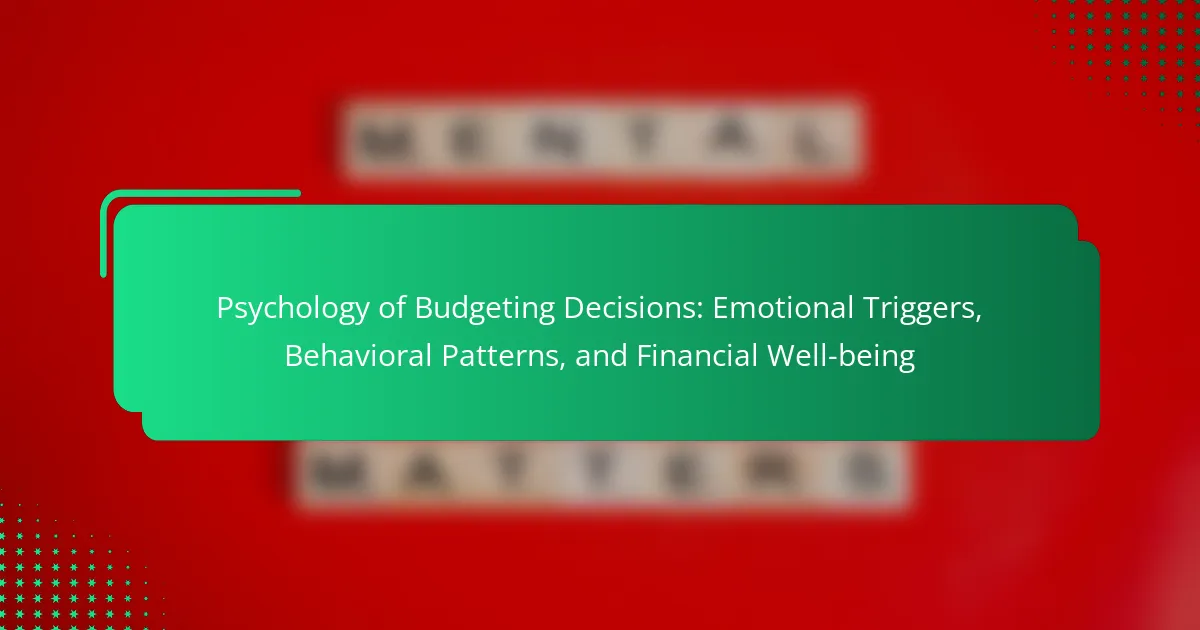Understanding the psychology of budgeting decisions is crucial for enhancing financial well-being. Emotional triggers influence resource allocation, while behavioral patterns reveal tendencies like impulse spending. Recognizing these factors helps individuals develop effective budgeting strategies. Implementing practical steps can lead to improved financial management and reduced anxiety.

What are the emotional triggers behind budgeting decisions?
Emotional triggers play a significant role in budgeting decisions. Factors such as fear of financial instability, desire for security, and social comparisons influence how individuals allocate their resources.
For instance, the fear of unexpected expenses can lead to overly cautious budgeting, often resulting in missed opportunities for investment. Conversely, the desire for financial freedom may encourage more aggressive spending or saving strategies, creating a tension between immediate gratification and long-term goals.
Social comparisons can also trigger budgeting behaviors, as individuals often adjust their spending based on perceived norms within their peer groups. This can lead to impulsive purchases or unnecessary expenses to maintain a certain image.
Understanding these emotional triggers is essential for developing effective budgeting strategies that enhance financial well-being.
How do feelings of anxiety and fear influence financial choices?
Feelings of anxiety and fear significantly impact financial choices by leading to avoidance behavior and impulsive spending. Individuals experiencing anxiety may prioritize short-term relief over long-term financial goals, resulting in poor budgeting decisions. Research indicates that heightened emotional states can skew risk perception, making individuals more likely to avoid investments or savings that seem risky. As a result, they may miss opportunities for financial growth. Understanding these emotional triggers is crucial for improving financial well-being and establishing healthier budgeting practices.
What role does happiness play in spending and saving behaviors?
Happiness significantly influences spending and saving behaviors. Individuals often spend more when experiencing positive emotions, seeking to enhance their joy through purchases. Conversely, negative emotions can lead to increased saving as individuals may feel the need to secure their financial future. Research indicates that happier individuals tend to budget more effectively, aligning their financial decisions with their emotional well-being. This connection highlights the importance of emotional triggers in the psychology of budgeting decisions.
How can positive emotions enhance budgeting strategies?
Positive emotions can significantly enhance budgeting strategies by fostering better decision-making and increasing motivation. When individuals feel positive, they are more likely to engage in proactive financial behaviors. For instance, optimism can lead to a greater willingness to save and invest, as people envision favorable outcomes. Moreover, positive emotions can reduce stress associated with financial planning, allowing for clearer thinking and more rational choices. This emotional state can also strengthen commitment to budgeting goals, as individuals are motivated by their positive outlook on achieving financial well-being.
What negative emotions can derail financial planning?
Negative emotions such as fear, anxiety, and guilt can significantly derail financial planning. Fear of financial instability may lead to avoidance of budgeting, while anxiety can cause impulsive spending. Guilt over past financial decisions may hinder proactive financial management. These emotional triggers disrupt rational decision-making and can impede long-term financial well-being.

What behavioral patterns emerge in budgeting practices?
Behavioral patterns in budgeting practices often reveal emotional triggers influencing financial decisions. Individuals may exhibit tendencies like impulse spending, avoidance of financial planning, or reliance on mental accounting. Emotional factors, such as stress or anxiety, can lead to irrational budgeting choices, impacting overall financial well-being. Additionally, social influences and peer comparisons can shape budgeting behaviors, prompting individuals to adjust their spending to align with perceived norms. Understanding these patterns helps in developing effective budgeting strategies that promote healthier financial habits.
How does procrastination affect financial decision-making?
Procrastination negatively impacts financial decision-making by fostering impulsive choices and increasing stress. Delaying budgeting tasks can lead to missed opportunities for savings and investment. Research indicates that individuals who procrastinate often experience anxiety, which clouds judgment and results in poor financial outcomes. This behavior can create a cycle where financial stress leads to further procrastination, ultimately harming financial well-being.
What is the impact of impulsive buying on budgeting?
Impulsive buying negatively impacts budgeting by creating unplanned expenses that disrupt financial plans. These emotional triggers lead to behavioral patterns where individuals prioritize immediate gratification over long-term financial goals. Studies show that 60% of consumers engage in impulsive buying, often resulting in increased debt and financial stress. Understanding these patterns can enhance financial well-being by promoting mindful spending and better budgeting strategies.
What strategies can mitigate impulsive spending?
To mitigate impulsive spending, implement strategies that enhance self-awareness and emotional regulation. Create a detailed budget to track expenses and set clear financial goals. Use the “24-hour rule” to delay purchases, allowing time to assess needs versus wants. Establish a support system to discuss financial decisions, which can provide accountability and perspective.
How do cognitive biases shape budgeting decisions?
Cognitive biases significantly influence budgeting decisions by distorting perception and judgment. For instance, loss aversion leads individuals to prioritize avoiding losses over acquiring gains, affecting spending and saving behaviors. Anchoring bias can cause people to rely too heavily on initial budget figures, even when circumstances change. Additionally, overconfidence bias may result in unrealistic financial forecasts, leading to inadequate budgeting. These biases ultimately impact financial well-being by fostering poor decision-making and emotional distress. Understanding these biases can help individuals create more effective budgeting strategies.

What universal attributes define effective budgeting?
Effective budgeting is defined by emotional awareness, behavioral patterns, and proactive financial management. Emotional triggers, such as fear and anxiety, influence spending decisions, while behavioral patterns reveal tendencies in financial habits. Understanding these elements leads to improved financial well-being. Key attributes include self-discipline, goal-setting, and adaptability. These attributes help individuals navigate financial challenges and make informed decisions. Recognizing the psychological aspects of budgeting can enhance financial strategies and promote long-term stability.
What are the core principles of successful budgeting?
Successful budgeting hinges on understanding emotional triggers and behavioral patterns. Key principles include setting clear financial goals, tracking expenses diligently, and adjusting budgets based on real-time data. Emotions significantly influence spending habits, often leading to impulsive decisions. Recognizing these triggers can enhance financial well-being. Additionally, adopting a flexible approach allows for adjustments, ensuring that budgets remain relevant and effective over time.
How does setting financial goals improve budgeting outcomes?
Setting financial goals enhances budgeting outcomes by providing clear direction and motivation. Specific goals foster commitment, making individuals more likely to adhere to their budgets. Research shows that people with defined financial objectives experience greater financial well-being. This psychological clarity reduces emotional triggers that lead to impulsive spending, promoting healthier financial behaviors. Furthermore, tracking progress towards these goals reinforces positive behavioral patterns, ultimately leading to improved financial stability.

What unique attributes differentiate budgeting strategies?
Unique attributes that differentiate budgeting strategies include emotional triggers, behavioral patterns, and their impact on financial well-being. Emotional triggers, such as anxiety or optimism, influence decision-making processes. Behavioral patterns, like impulsivity or discipline, shape spending habits. Additionally, strategies vary in their effectiveness for enhancing financial well-being, with some promoting long-term stability while others focus on short-term gains. Understanding these unique attributes helps individuals select the most suitable budgeting strategy for their personal financial goals.
How do personal values influence budgeting decisions?
Personal values significantly influence budgeting decisions by shaping priorities and spending habits. Individuals often allocate resources based on what they deem important, such as family, health, or personal growth. For example, someone who values education may prioritize spending on courses or books over luxury items. This alignment between values and financial choices enhances financial well-being and satisfaction. Understanding these emotional triggers can lead to more mindful budgeting practices.
What innovative budgeting methods are gaining popularity?
Innovative budgeting methods like zero-based budgeting, the envelope system, and digital envelope apps are gaining traction. These approaches focus on emotional triggers and behavioral patterns that enhance financial well-being. Zero-based budgeting requires every dollar to have a purpose, promoting intentional spending. The envelope system physically allocates cash to specific categories, reducing impulsive purchases. Digital envelope apps modernize this concept, offering convenience while tracking expenses. Each method emphasizes mindfulness in budgeting, aligning financial goals with emotional triggers.

What rare attributes can enhance financial well-being?
Understanding rare attributes can significantly enhance financial well-being by addressing unique emotional triggers. One rare attribute is “financial mindfulness,” which involves being aware of one’s spending habits and emotional responses to money. This practice can lead to better budgeting decisions and reduced financial anxiety. Another rare attribute is “goal visualization,” where individuals mentally picture their financial objectives, fostering motivation and commitment. These attributes create deeper connections between emotions and financial behaviors, ultimately improving overall financial well-being.
How can mindfulness practices improve budgeting effectiveness?
Mindfulness practices can enhance budgeting effectiveness by fostering emotional awareness and reducing impulsive spending. These practices encourage individuals to reflect on their financial behaviors and identify triggers for emotional spending. By cultivating a mindful approach, individuals can develop healthier financial habits that align with their long-term goals. Research indicates that mindfulness can lead to improved financial decision-making and increased financial well-being.
What uncommon budgeting tools can lead to better financial health?
Uncommon budgeting tools can enhance financial health by addressing emotional triggers and behavioral patterns. Tools like the 50/30/20 rule, which allocates income into needs, wants, and savings, help individuals visualize their spending. Another effective method is the envelope system, where cash is allocated for specific categories, promoting discipline. Additionally, gamification apps can engage users emotionally, turning budgeting into a rewarding challenge. Lastly, zero-based budgeting encourages intentional spending by requiring every dollar to have a purpose, fostering a deeper understanding of financial habits.

What practical steps can improve budgeting decisions?
To improve budgeting decisions, individuals can implement practical steps that address emotional triggers and behavioral patterns. First, establish clear financial goals to create motivation and focus. Second, track spending habits to identify emotional spending triggers. Third, create a realistic budget that accommodates flexibility for unexpected expenses. Fourth, review and adjust the budget regularly to reflect changing circumstances and improve financial well-being.
What common mistakes should be avoided in budgeting?
To avoid common budgeting mistakes, recognize emotional triggers and behavioral patterns. Failing to set realistic goals can lead to frustration. Ignoring variable expenses may disrupt financial stability. Underestimating spending habits often results in overspending. Neglecting to review budgets regularly can hinder financial well-being. Emphasizing short-term gratification over long-term planning may jeopardize future savings.
How can individuals optimize their budgeting strategies for long-term success?
Individuals can optimize their budgeting strategies by understanding emotional triggers and behavioral patterns. Recognizing how emotions influence spending helps in making informed financial decisions. For instance, setting clear financial goals can mitigate impulsive purchases. Tracking expenses regularly fosters accountability, enhancing financial well-being. Incorporating mindfulness techniques can further reduce stress related to budgeting, promoting long-term success.
What role does regular review play in effective budgeting?
Regular review is essential for effective budgeting as it enhances financial awareness and adaptability. By regularly assessing budgets, individuals can identify emotional triggers influencing spending, allowing for better decision-making. This process helps reinforce positive behavioral patterns, ultimately contributing to improved financial well-being. Regular reviews foster accountability and encourage proactive adjustments, ensuring budgets remain aligned with financial goals.
How can accountability partners enhance budgeting discipline?
Accountability partners significantly enhance budgeting discipline by providing motivation and support. They help individuals stay committed to financial goals through regular check-ins and discussions about spending habits. This social aspect fosters responsibility, making it easier to resist emotional triggers that lead to impulsive decisions. Moreover, sharing progress with a partner can reinforce positive behavioral patterns, contributing to overall financial well-being.


